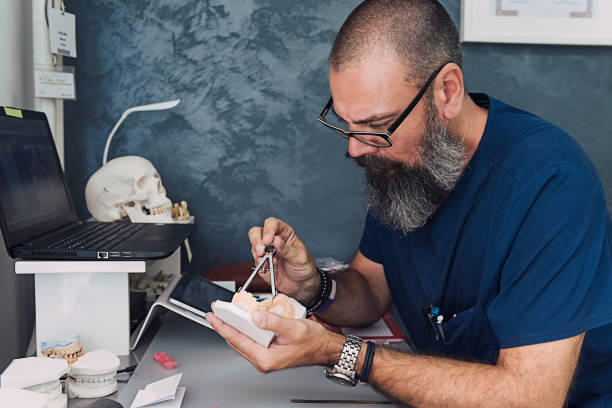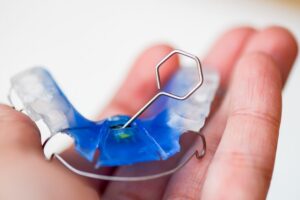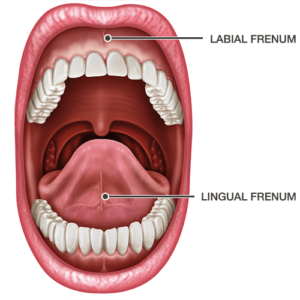It is necessary to follow standard brushing and flossing practices to keep the dental system healthy and functionally perfect. However, it is a fact that despite a healthy oral care regimen people develop plaque and tartar. In such a scenario, your dentist might recommend a deep tooth cleaning procedure involving periodontal scaling and root planning. Ignoring plaque and tartar is not an option as it could lead to severe gum disease resulting in teeth decay and bone degeneration. Dental scaling along with root planing could reverse the gum disease making it possible to regain the natural shine and strength of your teeth.
The best possible smile solution to keep the dental system healthy is to visit a dentist at least twice a year. Depending on the severity of your case, the dentist might recommend dental scaling using a manual dental scaler and/or ultrasonic dental scaler. The ultrasonic scaling is highly effective in removing tartar, plaque, and biofilms from teeth and gum lines. Unlike regular teeth cleaning, deep cleaning involves some risks. So, before you give your nod for dental scaling, here is all you need to know about deep cleaning using a dental scaler:
What is Teeth Scaling Procedure?
Plaque, a sticky film containing harmful bacteria that forms on the surface of teeth, can be prevented with effective brushing. However, regular brushing isn’t effective in removing plaques that form between teeth. If left ignored for long, it calcifies and forms tartar, and causes disease. If not treated in time, it could lead to gum recession, bone and teeth decay. Following a detailed examination, your dentist might recommend “deep cleaning”, which involves teeth scaling and root planing. Unlike regular dental cleaning procedures, deep cleaning is a more in-depth procedure and helps in treating chronic periodontal diseases. Your dentist will administer local anesthesia and remove plaques and tartars in stages to improve gum health.
What is A Dental Scaler?
Blame it on food habits, dental hygiene, ineffective design of a brush, or brushing style, but you cannot ignore plaques for long. The interdental brush helps, but if plaques have calcified you might need something stronger to scratch the deposit. A dental scaler, a metal hand tool with a hook at the other end, is highly effective in removing plaques from the teeth surface and spaces in between teeth and under gums.
The dental structure is very delicate, so the effectiveness of the dental scaler depends on the efficiency of the user. Wrong handling could damage the enamel and injure gums, leading to sensation and inflammation. It is better to get in touch with a professional dentist for plaque removal. Dentists use more advanced tools, like ultrasonic or piezoelectric dental scalers to remove hardened plaques without harming your natural teeth.
The technique, tool, and frequency of teeth scaling are very crucial for dental health. So, it is better to get it done by someone who has been professionally trained for the deep cleaning procedure. It is not just about having the best equipment at your home, but the art of using it effectively without causing irreversible damage to natural teeth. The risk involved rises manifold with bridges, implants, or fillings. Dental professionals know about the risks involved, so they take all necessary precautions to keep your teeth and gums safe while deep cleaning using suitable dental scalers.
When Do You Need Teeth Scaling?
It is a fact that you can prevent plaque buildup with effective brushing. If you visit the dentist at regular intervals he will make sure to keep your teeth clean, not just for whitening but to keep supporting gums and bones healthy. Dentists recommend teeth scaling and root planing for treating advanced periodontal disease. Once the gum starts receding from teeth, the pockets between gums and teeth become larger, making it more prone to bacterial infection and deposition of plaque in deeper areas where bristles fail to reach.
So, if you are noticing signs of gum disease it is better to consult your dentists at the earliest for deep cleaning so that permanent damage to teeth, bone, and gums could be prevented. Weak gums and erodes bones will ultimately lead to tooth loss.
Periodontal disease is very common across the globe, particularly among people above 30 years of age. The only possible way to keep your dental system healthy is to follow a standard oral care regimen strictly and visit your dentist regularly. This becomes more important if:
- Your dental hygiene is not up to the mark
- You smoke
- In the higher age group
- Experiencing hormonal changes
- Diet is not balanced and lacks nutrition
- Family history of periodontal disease
- Structural issues related to teeth misalignment
- Your gums bleed while brushing
- Gums are red and inflamed
- Breath isn’t naturally fresh
What Happens During Teeth Scaling?
Your dentist will first examine your teeth and gums to measure the severity of your gum disease and accordingly suggest multistage teeth scaling and root planing procedures. In most cases, the procedure is done in one session, but if the gum is severely damaged, you might need more than one appointment. To ease your anxiety and pain, your dentist might administer local anesthesia.
Once the area is made numb, your dentist will start the teeth scaling procedure using a dental scaler tool to remove plaques from teeth and large pockets between teeth and gum line. Your dentist might use a laser or ultrasonic scaler first to dismantle hardened plaques and then use a manual dental scaler to scrap the loosened plaques and tartars.
Once scraping is done and oral space is cleaned, your dentist will conduct the root planing procedure to smoothen the tooth root to enable better and speedy reattachment of affected gums to the teeth. If gum recession is severe meaning pockets are exceptionally large, your dentist might recommend some additional treatment.
Since it is all about controlling the bacterial outgrowth in oral space, your dentist may prescribe antimicrobial agents and some antibiotic medication to boost healing.
What Are The Benefits of Teeth Scaling?
Teeth scaling and root planing are the most recommended treatments for periodontal disease. It is highly effective in reducing pocket gaps, thus helpful in preventing tooth, bone, and tissue loss. A deep cleaning procedure is recommended when pocket-size increases more than 5 mm. However, it all depends on efficiency in using the dental scaler tools as mishandling could irreversibly damage teeth enamel and gums. Here are some of the benefits of deep cleaning using dental scalers:
- It stops the progress of the chronic periodontal disease
- It treats reduces the pocket size thus control bacterial growth
- Bacterial control helps in controlling infection and boost healing
- Plaque removal boosts oral health and dental aesthetics
- Bacteria control helps in improving breath
- Protects root thus strengthens natural teeth
Disadvantages of Deep Cleaning
The dental system is highly complex so using tools like dental scalers to scrape plaque has its own risk. It helps in preventing gum disease, but some of the risks involved with the deep cleaning procedure are:
- Possibility of nerve damage
- Plaque removal is done to ensure better reattachment of gums to teeth, but there is no guarantee of reattachment
- If not executed as per standard practices it may trigger gums recession
- If your immune system is weak, the procedure could cause infection
- Mishandling of dental scaler could affect enamel
- The procedure could cause temporary pain and discomfort
All the risks are not about the tool, but the technique and efficiency of the person who is using it to remove plaques. Your teeth are too precious for experimentation, so get in touch with your dentist to get quality treatment with minimum discomfort.
What to Expect After Teeth Scaling Procedure?
At the end of the treatment, your teeth will be plaque and tartar-free. You will have brighter teeth with a natural shine, and most importantly your oral space will not allow bacterial outgrowth. Depending on the severity of the periodontal disease, you might have to visit a dentist more than once, followed by an additional appointment to check procedural success and the possibility of infection.
In most cases, you will resume normal oral functionalities after the deep cleaning procedures involving teeth scaling and root planing. You are free to eat your favorite foods, but avoid eating crunchy and hard food items and drinking too hot or too cold beverages to avoid the sensation.
Don’t forget to continue brushing twice a day using a soft-bristled brush. Avoid flossing for a few days and restart as your doctor recommends. If your dentist has prescribed some medication, you should continue taking it as per prescription to prevent infection and pain. Cleaning is the key, so follow whatever your doctor suggests and visit your dentist on schedule to keep your dental system healthy.
How to Reduce Sensitivity after the Deep Cleaning Procedure?
Removing plaques from the teeth surface could cause sensitivity for a few days. Although sensitivity goes away naturally in 4-5 days, you can reduce it by following these tips:
- Eating soft foods for a few days
- Avoid eating foods and drinking beverages when they are too hot or cold.
- You can take over-the-counter medications for pain and inflammation control
- Rinsing the mouth with lukewarm saltwater could help reduce sensitivity
- Don’t let bacteria count rise by brushing twice a day
Is Deep Cleaning Painful?
The use of any device on the dental system could cause discomfort. To help you relax and manage anxiety, the dentist might administer local anesthesia. It will numb the area so you won’t feel any pain during the procedure. Some sensitivity and discomfort are normal, if gums swelling persists and bleeds you should get in touch with your doctor for medications.
How Much Does Deep Teeth Cleaning Cost?
Depending on the severity of gum disease and the spread of plaque, the cost of deep cleaning varies. Other factors determining the cost are the location of the dental, the expertise of the dentist, and of course the number of visits you need to make. You might have to pay $100 or more per quadrant. If you have dental insurance, your insurer might cover deep cleaning as it affects your dental health.
The Takeaway
A healthy dental system is very crucial for overall health. If you are experiencing gum-related difficulty, then ignoring it for long is not advisable. Brushing and flossing are important, but using a dental scaler could be risky as it needs meticulous handling. Mishandling could worsen the situation. So, better book an appointment with your doctor and let him do the deep cleaning. Ultimately it is all about having functionally perfect and aesthetically brilliant teeth, so why take the risk.
Sources:
- Chen, S. J., Liu, C. J., Chao, T. F., Wang, K. L., Chen, T. J., Chou, P., … & Chiang, C. E. (2013). Dental scaling and atrial fibrillation: a nationwide cohort study.
https://www.sciencedirect.com/science/article/pii/S0167527313002520 - Fleischer, H. C., Mellonig, J. T., Brayer, W. K., Gray, J. L., & Barnett, J. D. (1989). Scaling and root planing efficacy in multirooted teeth.
https://aap.onlinelibrary.wiley.com/doi/abs/10.1902/jop.1989.60.7.402 - Beretta, M., & Federici Canova, F. (2017). A new method for deep caries treatment in primary teeth using ozone: a retrospective study.
https://ejpd.eu/virtual/download/EJPD_2017_2_4.pdf - Deas, D. E., Moritz, A. J., Sagun Jr, R. S., Gruwell, S. F., & Powell, C. A. (2016). Scaling and root planing vs. conservative surgery in the treatment of chronic periodontitis.
https://onlinelibrary.wiley.com/doi/abs/10.1111/prd.12114



